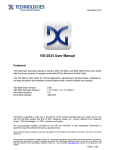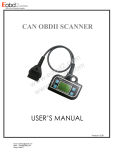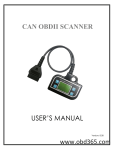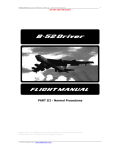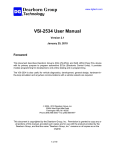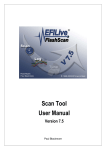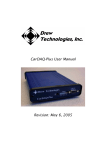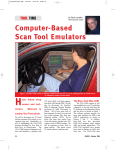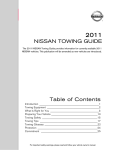Download AutoTap OBDII Diagnostic Scanner
Transcript
User’s Manual USB AutoTap / Serial AutoTap This product designed and manufactured in Ottawa, Illinois USA by © 1998-2005 B&B Electronics Mfg. Co. Documentation Number: AT-3105 Manual B&B Electronics Mfg Co Inc – 707 Dayton Rd - PO Box 1040 - Ottawa IL 61350 - Ph 815-433-5100 - Fax 815-433-5104 3.1.2 TABLE OF CONTENTS 3.2 How this guide is organized.................................................1 Conventions used in this guide............................................1 REPAIR SERVICE...............................................................3 Chapter 1: Product Introduction .........................................4 1.1 Package Contents....................................................5 1.2 AutoTap, My Car and My PC ...................................5 Chapter 2: Getting Started ....................................................8 2.0 Installing the USB Drivers ........................................8 2.1.1 AutoTap USB Driver Installation ..........................8 2.1.2 Installing AutoTap software from the CD-ROM....9 2.1.3 Installing AutoTap from the Internet ...................12 2.2 Connecting the Hardware ......................................12 2.2.1 Connecting the AutoTap Hardware to your PC and Automobile ..............................................................12 2.3 Software Registration (Serial and USB).................13 2.3.1 First time installation ..........................................13 2.3.2 Using AutoTap for Windows Software ...............14 2.4 Saving Your Configuration .................................16 2.4.2 Opening Your Configuration...............................17 3.2.2 Advanced features of a gauge ...........................23 Graph Window .......................................................24 3.3.1 Defining a graph.................................................24 3.3.2 Advanced features of a graph ............................24 DTC/Emissions Status Window .............................25 3.4.1 DTC Screen .......................................................25 3.4.1 Emission Test Screen ........................................29 3.5 AutoTap Status Bar................................................32 Chapter 4: Data Logging with AutoTap .............................33 4.1 How to log data ......................................................33 4.2 How to review a log file ..........................................34 4.2.1 Playing a log file with its associated config file. ....34 4.3 How to export logged data .....................................35 Chapter 5: Troubleshooting ...............................................37 5.1 Helpful Hints...........................................................37 ® AutoTap ATS Model Technical Specifications................40 AutoTap® ATU Model Technical Specifications................41 AutoTap Appendix.................................................................1 Anatomy of the Diagnostic Trouble Code ............................1 Saving/Opening Your Configuration ......................16 2.4.1 Defining a gauge ................................................22 3.4 Welcome!.............................................................................4 Gauge Window ......................................................22 3.2.1 3.3 WARRANTY INFORMATION ..............................................3 Advanced features of a table .............................21 Types of DTC's ....................................................................2 OBDII Acronyms and Jargon ...............................................3 Chapter 3: Setting Up AutoTap to Display Data ...............19 3.1 Parameter Table Window ......................................20 3.1.1 Defining a table ..................................................20 Documentation Number: AT-3105 Manual B&B Electronics Mfg Co Inc – 707 Dayton Rd - PO Box 1040 - Ottawa IL 61350 - Ph 815-433-5100 - Fax 815-433-5104 i ii Documentation Number: AT-3105 Manual B&B Electronics Mfg Co Inc – 707 Dayton Rd - PO Box 1040 - Ottawa IL 61350 - Ph 815-433-5100 - Fax 815-433-5104 WARNING: About this guide DO NOT attempt to operate or observe a computer while driving! Most readings can be obtained while stationary. If data must be obtained while driving, have a passenger operate and watch the computer, or use the AutoTap’s logging option for later review. This user manual contains complete information for the use of the AutoTap® OBDII Diagnostic Scanner. How this guide is organized WARNING: * Chapter 1: Product Introduction. An introduction to product features and content. * Chapter 2: Getting Started. A guide to installing the software and making the connection. * Chapter 3: Setting up AutoTap to Display Data. See the data and various ways to view it with AutoTap. * Chapter 4: Data Logging with AutoTap. Capturing and reviewing your vehicle’s data for analysis. * Chapter 5: Troubleshooting. Some answers to issues that you may run into and how to solve them. * Appendix: Explaining the codes and other industry jargon. DO NOT turn your engine on indoors unless you have proper ventilation. A running engine produces carbon monoxide; an odorless, colorless gas that can kill you. WARNING: Do not use a power inverter power supply to power your laptop while using AutoTap. This power supply will damage your AutoTap. Conventions used in this guide To make sure that you perform setup tasks properly, take note of the following symbols used throughout this manual. WARNING! Important information to prevent injury. CAUTION! Information to prevent damage to components. IMPORTANT! Information that is critical to success of task. NOTE! Tips and other helpful information. Documentation Number: AT-3105 Manual B&B Electronics Mfg Co Inc – 707 Dayton Rd - PO Box 1040 - Ottawa IL 61350 - Ph 815-433-5100 - Fax 815-433-5104 1 2 Documentation Number: AT-3105 Manual B&B Electronics Mfg Co Inc – 707 Dayton Rd - PO Box 1040 - Ottawa IL 61350 - Ph 815-433-5100 - Fax 815-433-5104 Chapter 1: Product Introduction WARRANTY INFORMATION All B&B Electronics products carry a five year limited warranty. Product warranty or service will not be extended if the product is modified or altered. Returns: If, for any reason, you wish to return a hardware product purchased direct from us, you may return it via UPS or insured Parcel Post, undamaged, with the receipt, within 30 days of purchase, for a full refund, less shipping charges. Call, fax, e-mail or write to request a Return Material Authorization (RMA) number and routing instructions. Packages returned without prior authorization will be refused. All products returned to B&B after 30 days may be charged a 20% restocking fee. Duties, taxes and customs charges are the buyer’s responsibility. Welcome! Thank you for buying AutoTap® OBDII Diagnostic Scanner! Products purchased from resellers must be returned through the reseller. The AutoTap® OBDII Diagnostic Scanner, coupled with a personal computer, allows you to access your OBDII vehicle’s computer modules. Vehicle data, which was once only available to dealership technicians using expensive factory scan tools, is now only a few mouse clicks away at your PC! AutoTap® is the prime choice for users ranging from the do it yourself beginner, to the professional service personnel. REPAIR SERVICE We offer a repair service for products that are out of warranty. Please call, fax, e-mail or write to request a Return Material Authorization (RMA) number. Duties, taxes and customs charges are the buyer’s responsibility. ~ Read Diagnostic Trouble Codes (DTCs) B&B Electronic Mfg. Co. - Contact Information Address: 707 Dayton Road PO Box 1040 Ottawa, IL 61350 ~ Reset “Check Engine” light trouble codes ~ Check if your vehicle is ready for Emissions Certification ~ View real-time vehicle operation data Telephone: Fax: (815) 433-5100 (815) 433-5105 Website: www.autotap.com (AutoTap) www.bb-elec.com (B&B Electronics) www.obdii.com (OBDII Information) Email: ~ View data in list, graph, or gauge modes ~ Record real-time vehicle operation data for future analysis The AutoTap® OBDII Diagnostic Scanner is the perfect scan tool whether you are simply diagnosing a problem, or analyzing and tuning your vehicle for maximum performance! [email protected] (Support) [email protected] (Sales) [email protected] (Resellers) Documentation Number: AT-3105 Manual B&B Electronics Mfg Co Inc – 707 Dayton Rd - PO Box 1040 - Ottawa IL 61350 - Ph 815-433-5100 - Fax 815-433-5104 3 4 Documentation Number: AT-3105 Manual B&B Electronics Mfg Co Inc – 707 Dayton Rd - PO Box 1040 - Ottawa IL 61350 - Ph 815-433-5100 - Fax 815-433-5104 1.1 CAUTION: There are some 1994 and 1995 vehicles with this connector. Although the connector is the same as OBDII, most of these vehicles will have an OBD I compliance sticker under the hood and will NOT work with the AutoTap scanner. However, there are a few pre-’96 vehicles that will work with AutoTap. A list of these vehicles is available at www.obdii.com/connector.html. Package Contents Check your AutoTap® package for the following items. AutoTap Hardware Converter Module AutoTap CD (includes this manual) Software Registration Certificate Quick Start Guide Serial Version √ √ √ √ USB Version √ √ √ √ Will my laptop or desktop PC work with AutoTap? Typically, a PC that has a serial port and runs Windows 95 (or newer) will be enough to run the serial version of AutoTap. The USB version requires your PC to have a USB port and run Windows 98 or newer. NOTE: If any of the above items are damaged or missing, please contact B&B Electronics immediately. 1.2 AutoTap, My Car and My PC The AutoTap® OBDII Diagnostic Scanner is designed to operate on USA-spec OBDII-equipped cars. This includes model year 1996 and newer cars, light trucks and SUV’s. The software bundled with the AutoTap hardware is designed to run on any desktop or laptop PC equipped with one serial port or USB and running Windows 98 or newer. Let us begin with a few basics to become familiar with the hardware/software compatibility between your car and PC. Here is a list of minimum PC hardware requirements: √ √ √ √ √ √ √ How do I find out if my vehicle meets OBDII specifications? Begin by looking under the hood for a sticker stating that the vehicle meets OBDII compliance specifications. Pentium 233Mhz or better (or equivalent AMD processor) Windows 95, 98, NT, ME, 2000 or XP 50 MB of free hard drive space 32 MB RAM (64+ MB recommended) CD-Rom Drive (Only used for installation) 9-pin male RS-232 (Serial) Port for serial model numbers USB port of USB model numbers *NOTE: Windows 95 and Windows NT do not support USB. NOTE: All USA-spec vehicles manufactured in 1996 and later are OBDII compliant. However, 1997 and newer vehicles may not have the OBDII sticker under the hood. OBDII vehicles have a 16-pin connector under the dash or in another location near the driver’s seat. Sometimes, there is a plastic cover that is slightly larger than the AutoTap connector concealing the vehicle’s OBDII port. This cover is usually labeled “OBDII.” Remove this cover if your vehicle is equipped with it. The 16-pin OBDII port pictured below is the connector that you will see and be attaching to the AutoTap Scanner shortly. Documentation Number: AT-3105 Manual B&B Electronics Mfg Co Inc – 707 Dayton Rd - PO Box 1040 - Ottawa IL 61350 - Ph 815-433-5100 - Fax 815-433-5104 5 6 Documentation Number: AT-3105 Manual B&B Electronics Mfg Co Inc – 707 Dayton Rd - PO Box 1040 - Ottawa IL 61350 - Ph 815-433-5100 - Fax 815-433-5104 Chapter 2: Getting Started 2.0 Installing the USB Drivers IMPORTANT: It is important that you understand the basic operation of the Windows operating system and have a basic understanding of your personal computer (PC). If you have questions about Windows or your computer hardware, please have the user guides that came with the computer available. NOTE: If you have the serial version of AutoTap (with a 9-pin connector that plugs into your computer, please skip to section 2.1.2 2.1.1 AutoTap USB Driver Installation 1) Insert the AutoTap CD in your CD ROM drive. The CD will automatically load. If It doesn’t, click the “Start” button, click “Run” and type D:Setup (where D is the letter of your CD ROM.) 2) From the main menu, select “Install USB AutoTap drivers” Documentation Number: AT-3105 Manual B&B Electronics Mfg Co Inc – 707 Dayton Rd - PO Box 1040 - Ottawa IL 61350 - Ph 815-433-5100 - Fax 815-433-5104 7 8 Documentation Number: AT-3105 Manual B&B Electronics Mfg Co Inc – 707 Dayton Rd - PO Box 1040 - Ottawa IL 61350 - Ph 815-433-5100 - Fax 815-433-5104 3) Connect the USB version of AutoTap to your computer when prompted. Follow the on screen instructions to install two sets of drivers needed by AutoTap. 3) Click on the “Next” button to begin installation of the software. This will bring you to the Destination Folder screen as seen below. The software will then prompt you to specify the directory in which the software will be installed. The default directory is listed and it is recommended that the default directory be used for most installations. If you need to change the installation location, then you will need to click on “Browse” at this time and make the necessary directory changes. 4) When the driver installations are complete, skip to section 2.1.2 below to install your software. NOTE: If you need to uninstall the USB drivers, ensure that AutoTap is unplugged from your computer, then click Start > Settings > Control Panel > Add or Remove Programs, select USB AutoTap Drivers and follow the on screen instructions. 2.1.2 Installing AutoTap software from the CD-ROM NOTE: The AutoTap software may be installed on your PC/laptop at any time. The computer does not have to be attached to either the AutoTap cable or the car for AutoTap software installation. 1) Insert the AutoTap CD in your CD ROM drive. The CD will automatically load. If It doesn’t, click the “Start” button, click “Run” and type D:Setup (where D is the letter of your CDROM.) 4) After you have selected your destination folder for the software installation, click on “Next.” 2) From the main menu, select “Install Software” and then choose AutoTap for Windows. When the installation begins, you’ll see: Documentation Number: AT-3105 Manual B&B Electronics Mfg Co Inc – 707 Dayton Rd - PO Box 1040 - Ottawa IL 61350 - Ph 815-433-5100 - Fax 815-433-5104 9 10 Documentation Number: AT-3105 Manual B&B Electronics Mfg Co Inc – 707 Dayton Rd - PO Box 1040 - Ottawa IL 61350 - Ph 815-433-5100 - Fax 815-433-5104 5) You will now be taken to a confirmation screen. At this point you can go back to the destination screen to make changes if needed. If no changes are needed click on “Next” to continue. 2.1.3 Installing AutoTap from the Internet 1) Start your internet browser. 2) Type: www.autotap.com into the Address bar of your Internet browser. 3) Click on “Downloads.” 4) Click on “Windows software” in the middle of the page. Here you will be presented with a variety of options. Please read the page carefully. 5) Once you have selected your download, you will want to save the download to a location on your hard drive, which you will be able to easily find. 6) Once the download is complete, run the downloaded file and refer to Section 2.1.2 of this manual for complete software install procedures. 6) AutoTap software installation will now begin as seen below. 2.2 Connecting the Hardware The AutoTap® OBDII Diagnostic Scanner Hardware is designed to provide a link between the automobile’s OBDII computer and your computer without using complicated cabling, bulky translation boxes or other hardware that may be inconvenient for regular use. CAUTION: AutoTap Hardware as well as your personal computer (PC) is sensitive to static electricity. Do not touch any of the connector pins on the cables, module, or your PC as damage may result to the component. 7) Once the file copy is complete, click on “Close” to complete the installation process. An “AutoTap Diagnostic Scan Tool” icon will be placed on your Windows Desktop. A program group will also be created in your Windows “Start” menu. 2.2.1 Connecting the AutoTap Hardware to your PC and Automobile 1) Connect the 9-pin serial cable, or the USB cable of the AutoTap module to your PC. (The serial port on your PC may be marked as “COM” or “RS-232” or have a modem symbol on it.) IMPORTANT: Some personal computers do not have a serial port. If you own a serial AutoTap and your PC does not have a serial port, you will need to use a serial port to USB port converter module. You will need to order part number UC232A for Windows 98, Me, and 2000 computers, and Edgeport/1 for XP machines from B&B Electronics in order for the AutoTap hardware and software to work as designed. CONGRATULATIONS! You have successfully installed AutoTap on your PC! Documentation Number: AT-3105 Manual B&B Electronics Mfg Co Inc – 707 Dayton Rd - PO Box 1040 - Ottawa IL 61350 - Ph 815-433-5100 - Fax 815-433-5104 11 12 Documentation Number: AT-3105 Manual B&B Electronics Mfg Co Inc – 707 Dayton Rd - PO Box 1040 - Ottawa IL 61350 - Ph 815-433-5100 - Fax 815-433-5104 2) With the key turned to the ON position (engine does not have to be running), plug the OBDII cable end of the module into the automobile’s 16-pin OBDII connector (refer to Section 1.2 of this manual to identify the connector). You are now ready to register your AutoTap software. 2.3 Software Registration (Serial and USB) IMPORTANT: Please locate the Software Registration Certificate supplied by B&B Electronics with the A utoTap product. If you cannot find this item, please contact B&B Electronics customer service. 2.3.1 First time installation 1) Make sure your computer is booted to Windows and that all your programs are closed. (If your computer is not on, turn on and let it boot up.) 2) Ensure that the AutoTap hardware is connected to your vehicle as described in the previous section and that your vehicle’s key is in the “On” position. 3) Double click on the “AutoTap Diagnostic Scan Tool” icon on your Windows desktop screen. 5) Enter the product registration number and click on “Register”. Your AutoTap is now registered. Save your registration information in case you need to re-install the software on this or another computer. 2.3.2 Using AutoTap for Windows Software 1) After you have successfully registered your software, AutoTap will attempt to retrieve your vehicle’s VIN. If your vehicle supports automatic VIN retrieval, skip to #4 below 2) If AutoTap does not retrieve your vehicle’s VIN, you will be prompted to enter it. It is important that you enter all 17 characters of the VIN, or AutoTap will not work properly. Click “Connect with VIN”. 3) If you elect not to enter your VIN, you can select “Connect without VIN”. AutoTap will connect to your vehicle and display OBDII generic parameters. 4) The AutoTap software will search for the AutoTap hardware module and check for a valid software registration number. Since this is the first time you are running the software connected to the hardware, you will be prompted to enter the registration number before continuing. Documentation Number: AT-3105 Manual B&B Electronics Mfg Co Inc – 707 Dayton Rd - PO Box 1040 - Ottawa IL 61350 - Ph 815-433-5100 - Fax 815-433-5104 13 IMPORTANT: If you are registered for manufacturer’s enhanced parameters, you must enter your VIN. Connecting without the VIN will only allow viewing of OBDII generic parameters. 14 Documentation Number: AT-3105 Manual B&B Electronics Mfg Co Inc – 707 Dayton Rd - PO Box 1040 - Ottawa IL 61350 - Ph 815-433-5100 - Fax 815-433-5104 4) Once AutoTap has retrieved your VIN, or you have entered it, AutoTap will check for Diagnostic Trouble Codes (DTC), which may be stored in the onboard control module. The software will then retrieve a list of all scan tool parameters supported by the vehicle. Note that this may take a few minutes, depending on your vehicle and the speed of your computer. 5) Once the parameter detection process is complete, the screen will show all of your vehicle’s generic OBDII parameters and any diagnostic trouble codes. 2.4 Saving/Opening Your Configuration NOTE: It is recommended that you save your configuration whenever you connect to a new vehicle for the first time or make a change to one of the configured windows in your current configuration. This will save you time in future sessions with the same vehicle, and will allow you to make configuration changes without being connected to the vehicle. 2.4.1 Saving Your Configuration NOTE: By default, the AutoTap software will check for DTCs each time the software starts. If you would like to disable this feature, click on “Options” from the toolbar and deselect “Read DTCs at startup”. Saving your configuration is as simple as 1 – 2 – 3! You can save your vehicle configuration/information file at any time once AutoTap is running. Here is how: 1) Click on File at the top of the AutoTap screen. 2) Click on “Save Config File” in the drop down menu. NOTE: It is recommended that at this time you go to the File menu and select “Save Config As” in order to save the configuration file for the particular vehicle you are connected to. This way, you can bypass the parameter scan process the next time you connect to the vehicle. Save the file with a name that will easily identify the vehicle, i.e. 98 Chevy Malibu. NOTE: The first time a vehicle is connected, AutoTap must complete a full parameter scan. You are now connected and running the AutoTap software. You may continue on to configuring the AutoTap screen with data. 3) You will be prompted with a standard Windows “Save As” window. Type in the name you wish to use for the configuration file and click on “SAVE.” NOTE: If you select “Save Config File”, you will overwrite the existing config file. NOTE: AutoTap automatically loads the last-used config file if the VIN matches the connected vehicle. If the VINs don’t match, you will be prompted to open a previously saved config, or scan the current vehicle for supported parameters. Documentation Number: AT-3105 Manual B&B Electronics Mfg Co Inc – 707 Dayton Rd - PO Box 1040 - Ottawa IL 61350 - Ph 815-433-5100 - Fax 815-433-5104 15 16 Documentation Number: AT-3105 Manual B&B Electronics Mfg Co Inc – 707 Dayton Rd - PO Box 1040 - Ottawa IL 61350 - Ph 815-433-5100 - Fax 815-433-5104 2.4.2 Opening Your Configuration Opening your configuration file is also as simple as 1 – 2 – 3! You can open your configuration file while connected to the vehicle or simply working at your desk setting up configuration screens. Here is how: 1) Click on File at the top of the AutoTap screen. 2) Click on “Open Config File…” in the drop down menu. 3) You will be prompted with a standard Windows “Open” window. Click on the name of the configuration file you wish to open and then click on “Open.” NOTE: There are buttons in the toolbar that contain the Save Configuration and Open Configuration functions. These are there to provide you with a quick means of performing these tasks. Move the mouse over the buttons to become familiar with what they are and they will save you time using drop down menus. Documentation Number: AT-3105 Manual B&B Electronics Mfg Co Inc – 707 Dayton Rd - PO Box 1040 - Ottawa IL 61350 - Ph 815-433-5100 - Fax 815-433-5104 17 18 Documentation Number: AT-3105 Manual B&B Electronics Mfg Co Inc – 707 Dayton Rd - PO Box 1040 - Ottawa IL 61350 - Ph 815-433-5100 - Fax 815-433-5104 3.1 Chapter 3: Setting Up AutoTap to Display Data Parameter Table Window The AutoTap® OBDII Diagnostic Scanner software can display diagnostic information in a variety of formats. This includes data tables, graphs and gauges. You can use the different display methods to fit your logging or viewing needs. For example, if you are logging data for future review, a data table display may be preferred. Or you can use the gauges to create a “virtual” dashboard. The flexibility of these formats allows for hundreds of combinations supplying you with maximum flexibility not only in diagnostics, but also in vehicle data acquisition for performance tuning. IMPORTANT: It is natural to want to see all data available. However, the more data you view, the slower each parameter’s value is refreshed. This is very important to remember as we cover viewing data, and especially logging. We recommend you display only the data related to the issue you’re working on. This will maximize the update rate. 3.1.1 Defining a table Defining a Table is as simple as 1 – 2 – 3! You can setup a few parameters in a Table and view data in no time. Here’s how. NOTE: To Create a Custom Configuration you will need to clear the current Display. Click on “File” on the top of the AutoTap Screen. This will display a drop down menu. Click on “Clear Page.” You are now ready to create your custom configuration!! Documentation Number: AT-3105 Manual B&B Electronics Mfg Co Inc – 707 Dayton Rd - PO Box 1040 - Ottawa IL 61350 - Ph 815-433-5100 - Fax 815-433-5104 19 1) Click on “Display” at the top of the AutoTap screen, or right click anywhere on the screen. 2) Click on “Add Table”. A blank table will be displayed on the screen. 3) Click “Add.” You will be presented with a “Category/Item” window in which you simply check the parameter(s) you want displayed in your table. Once you have selected your parameters, simply click on “OK.” This will insert your selected parameters into your table. 20 Documentation Number: AT-3105 Manual B&B Electronics Mfg Co Inc – 707 Dayton Rd - PO Box 1040 - Ottawa IL 61350 - Ph 815-433-5100 - Fax 815-433-5104 NOTE: For instant graphs and gauges, point your mouse at a parameter in your table and right-click on it. This will bring up a menu allowing you to instantly graph or setup a gauge for that item. NOTE: If you want to select all of the available parameters, simply click on the “Select all items” box in the lower left-hand corner. We recommend that you save one config file with all parameters selected for each vehicle. Once you have this file saved, you can configure additional screens and make other configuration files without being connected to your vehicle. NOTE: Do not place the same parameter in more than one display at a time. In other words, if you have Engine Speed in a table, do not also place it in a graph or gauge. 3.2 Gauge Window 3.2.1 Defining a gauge Defining a Gauge is as simple as 1 – 2 – 3! You can quickly setup a gauge and display data. 3.1.2 Advanced features of a table 1) Click on Display at the top of the AutoTap screen, or right click on a blank area of the screen. 2) Click on “Add Gauge”. A blank gauge will be displayed on the screen. 3) Click on “Change.” You will be presented with a “Category/Item” window in which you simply check the parameter you want displayed in your gauge. Once you have selected your parameter, click on “OK.” The “advanced” button gives you control over the “look and feel” of the table. From the “advanced” tab, you can change the color, size, and fonts used in the table. You can also set up alerts to have AutoTap notify you when a parameter’s data is above or below a value you supplied. Documentation Number: AT-3105 Manual B&B Electronics Mfg Co Inc – 707 Dayton Rd - PO Box 1040 - Ottawa IL 61350 - Ph 815-433-5100 - Fax 815-433-5104 21 22 Documentation Number: AT-3105 Manual B&B Electronics Mfg Co Inc – 707 Dayton Rd - PO Box 1040 - Ottawa IL 61350 - Ph 815-433-5100 - Fax 815-433-5104 3.3 Here is a picture of what your gauge may look like: Graph Window 3.3.1 Defining a graph You guessed it - defining a Graph is also as simple as 1 – 2 – 3! 1) Click on Display at the top of the AutoTap screen, or right click anywhere on the screen. 2) Click on “Add Graph”. A blank graph will be displayed on the screen. 3) Click “Insert.” You will be presented with a “Category/Item” window in which you simply check the parameter(s) you want displayed in your graph. Once you have selected your parameter(s), click on “OK.” 3.2.2 Advanced features of a gauge The “advanced” button gives you control over the “look and feel” of the gauge. From the “advanced” tab, you can change the gauge style, color, size, and fonts used in the gauge. You can also set up alerts to have AutoTap notify you when a parameter’s data is above or below a value you supplied. (The Gauge Range will need to be modified to fit the assigned parameter.) Here is a picture of what your graph may look like: 3.3.2 Advanced features of a graph The “advanced” button gives you control over the “look and feel” of the graph. From the “advanced” tab, you can change the color, size, and fonts used in the graph. You can also set up alerts to have AutoTap notify you when a parameter’s data is above or below a value you supplied. Documentation Number: AT-3105 Manual B&B Electronics Mfg Co Inc – 707 Dayton Rd - PO Box 1040 - Ottawa IL 61350 - Ph 815-433-5100 - Fax 815-433-5104 23 24 Documentation Number: AT-3105 Manual B&B Electronics Mfg Co Inc – 707 Dayton Rd - PO Box 1040 - Ottawa IL 61350 - Ph 815-433-5100 - Fax 815-433-5104 The following sections explain each element of the DTC Screen display and how it is used. 3.4 Check Engine Light Indicator The Check Engine Light, also known as Malfunction Indicator Light (MIL), will appear on the vehicle dashboard if any of the Emission Monitors have detected a reoccurring problem in the engine. (Some manufacturers may go above and beyond the spec, and turn on the light for other reasons) The lamp will usually remain on unless the fault does not occur again for three consecutive drive cycles. If the ODB II sees no further evidence of the problem, it will turn off the light and erase the code. DTC/Emissions Status Window 3.4.1 DTC Screen When the AutoTap Software has successfully connected to the vehicle and read the DTC codes and the DTC Window will be displayed. DTC stands for Diagnostic Trouble Codes. These are codes logged by the engine controller signifying problems in some area. When there’s a problem with your car and your check engine light is on, the first thing you’ll want to do is read the trouble codes. AutoTap makes it easy! AutoTap automatically checks for DTCs when you connect to your vehicle and start the software. AutoTap displays any trouble codes stored in the vehicle’s computer as well as any pending DTCs that have not yet caused the MIL to illuminate. If the Check Engine Light Indicator is turned on within the automobile dashboard, it will show as RED with the words CHECK in the Check Engine Indicator. The button to the right will read CLEAR. If the dashboard light is not illuminated, it will show as GREEN with the words OK in the Check Engine Indicator. The button to the right will be inactive if there are no DTCs detected. The user may choose to turn off the Check Engine Light Indicator within the dashboard by clicking the CLEAR button. The CLEAR button will send a message to the Vehicle on board computer to clear all DTC error codes and turn off the Engine Light. However, if there is really an engine problem, the error codes will reappear after a few Drive Cycles. See next section for more information on Drive Cycles. IMPORTANT: Clearing the engine light will ALSO clear the Emission Status Monitors on the following screen. It will be important to drive the car several times for one complete drive cycle (per the definition below) for these to be reset before an actual Emission test will pass. Documentation Number: AT-3105 Manual B&B Electronics Mfg Co Inc – 707 Dayton Rd - PO Box 1040 - Ottawa IL 61350 - Ph 815-433-5100 - Fax 815-433-5104 25 26 Documentation Number: AT-3105 Manual B&B Electronics Mfg Co Inc – 707 Dayton Rd - PO Box 1040 - Ottawa IL 61350 - Ph 815-433-5100 - Fax 815-433-5104 Since DTC Cleared Indicator DTCs and Descriptions The box labeled Since DTC Cleared is provides information on how long it has been since the last time someone clicked the CLEAR button to turn off the Check Engine Light and clear the DTCs. This is helpful since reoccurring errors will eventually turn the Check Engine Light back on. If the vehicle has been driven for significant time and distance and the DTC errors have not returned, this is an indicator that the error may no longer exist. Possible Diagnostic Trouble Codes (DTC) If the Onboard Computer has detected a fault, it will be displayed in the Possible Diagnostic Trouble Code Table. If the fault continues for more than 3 Drive Cycles, the trouble code will be moved to the Confirmed Diagnostic Trouble Code Table. The first column shows the error code number. The second column shows a text description of the error if available. Time Since DTC Cleared The AutoTap application starts a timer once the DTCs are cleared by using the CLEAR button. It will display how many hours and minutes the car has been driven since the last CLEAR. Confirmed Diagnostic Trouble Codes (DTC) If the fault continues for more than 3 Drive Cycles, the trouble code will be moved to the Confirmed Diagnostic Trouble Code Table. The first column shows the error code number. The second column shows a text description of the error if available. Distance since DTC Cleared Once the DTCs are cleared by using the CLEAR button, the distance counter starts. It will display how many miles the car has been driven since the last CLEAR. Common DTC Codes P0300 Misfire Possible Causes: Lean fuel due to vacuum leak in intake manifold, unmetered air getting past airflow sensor, or an EGR valve stuck open. Drive Cycle since DTC Cleared Once the DTCs are cleared by using the Clear button, the Drive Cycle counter starts. It will display how many Drive Cycles the car has been driven since the last CLEAR. If a problem is persistent in the vehicle engine, the DTC codes will register again after several Drive Cycles. (The number of cycles required vary by manufacturer, but is most commonly 3 full Drive Cycles) Emission Monitors also require one full Drive Cycle to set after the CLEAR. P0440 Vapor Leak Possible Causes: Loose gas cap Drive Cycle Definition A Drive Cycle is not just turning the ignition key on and off, or starting the engine. A drive cycle requires starting a cold engine and driving until the engine reaches normal operating temperature (at least an increase of temperature of 22 C (40 F) from start temperature and reaches a minimum temperature of 70 C (160 F). The engine must then be shut off and allowed to cool completely before a second cycle will be counted. Some vehicle manufactures even require an eight-hour cooling period before the next cycle is counted. Display Freeze Frame Button The vehicle’s computer stores freeze frame data at the time the DTC is set. When you Click Display Freeze Frame Button, you’ll see the conditions that were present at the time your check engine light illuminated. Documentation Number: AT-3105 Manual 28 B&B Electronics Mfg Co Inc – 707 Dayton Rd - PO Box 1040 - Ottawa IL 61350 - Ph 815-433-5100 - Fax 815-433-5104 27 Refresh Button Refresh will cause the AutoTap application to reconnect to the Vehicle and read the DTC and Emission Monitor codes again. The new values will be displayed. Make sure that the OBD II connector is plugged into the PC and the vehicle, and the key is turned ON. Documentation Number: AT-3105 Manual B&B Electronics Mfg Co Inc – 707 Dayton Rd - PO Box 1040 - Ottawa IL 61350 - Ph 815-433-5100 - Fax 815-433-5104 There are 11 monitors that are relevant to the emissions test. These monitors are set anytime a vehicle has a fault that may cause emissions to exceed the federal limits. It does not necessarily mean that the vehicle has a real emission problem. In some states, the motorists may be allowed to opt for a tailpipe test if their vehicle fails an OBD II test. Not all vehicles have all 11 monitors. If the monitor does not exist, it will show as NOT AVAILABLE. If a situation develops in any of the monitored systems that could cause an emissions problem, the OBD II will watch the situation, and set a code. If the situation continues, the CHECK ENGINE LIGHT will be lit. If the CHECK ENGINE LIGHT is ON, the car will not pass emissions testing. AutoTap Emission Test Screen Save Data Button Save Codes will create a text file of all current DTC and Emission Monitor Status. It will prompt you for a file name and location. This file can be open and read by any NotePad or text based editor. The Emission Status Screen shows the results of the Emission Test Data. These results are based upon Industry Standard Guidelines for emission controls. It should be noted, however, that the Standards are simply guidelines. Each individual state has its own testing criteria. Therefore, PASS or FAIL status does NOT guarantee that the same test results will occur in your state. Open Data Button Open Codes will open the text file with any saved DTC and Emission Monitor Status. The application will display a NotePad window for viewing the file. Emission Test Screen Button The Emission Test Screen button will switch views to the Emission Screen for viewing Emission Monitor status. Exit Clicking the Exit button will close the AutoTap program. 3.4.1 Emission Test Screen About Emission Test Methods. There are two methods that states use for Emission Certification tests. The older method uses the tailpipe test, which measures direct vehicle emissions. The newer method uses Onboard Diagnostic II (ODBII) tests. The ODBII method checks the Onboard computer monitors for the internal measurements of vehicle emissions data. The OBD II Tests will use a J1962 diagnostic tool similar to AutoTap. Documentation Number: AT-3105 Manual B&B Electronics Mfg Co Inc – 707 Dayton Rd - PO Box 1040 - Ottawa IL 61350 - Ph 815-433-5100 - Fax 815-433-5104 29 When this screen is initially displayed, the Vehicle Model Year must be set. These results of the test will depend upon the year the vehicle was manufactured. Older cars are given more leeway to fail in one or two monitor areas and yet still pass the Emission Status Testing. Newer cars are not allowed to have any monitor failures. The PASS/FAIL criterion depends upon the state where the test is performed. Once the Vehicle Model Year is selected, the test status will be displayed. 30 Documentation Number: AT-3105 Manual B&B Electronics Mfg Co Inc – 707 Dayton Rd - PO Box 1040 - Ottawa IL 61350 - Ph 815-433-5100 - Fax 815-433-5104 COMPLETE Vehicle Model Year The year the vehicle was manufactured. The Autotap program does not support any model years prior to 1996. NOT COMPLETE Emission Status There are 11 monitors that may signify emissions problems. To set the monitors correctly, the vehicle must be driven a certain distance at a variety of different speeds. The exact requirement depends upon the make and model of the vehicle. As a general rule, doing some stop-andgo driving around town plus 5-10 minutes on the highway will usually set all monitors. Please see Drive Cycle definition for more information. Emission Status will display one of three possible results: NOT READY – If Emission Status displays NOT READY this means that the engine has not completed all of its’ self-tests. In order for the engine to run the self tests a drive cycle must be completed. See the description of a drive cycle in this manual for more information. PASS – The Emission Status test is able to be run and has passed. FAIL – The Emission Status test is able to be run and has failed. The test will fail if the Check Engine Light is on and Confirmed Diagnostic Trouble Codes (DTCs) are present. MIL MIL or Malfunction Indicator Light is another name for the Check Engine Light. It will appear on the vehicle dashboard if any of the Emission Monitors have detected a reoccurring problem in the engine. The lamp will usually remain on unless the fault does not occur again for three consecutive drive cycles. If the ODB II sees no further evidence of the problem, it will turn off the light and erase the code. The MIL status field will show the status of the Check Engine Light in the vehicle. It will read either ON or OFF. The vehicle will not pass the Emissions Test if the Check Engine Light is ON. NOT SUPPORTED The Engine Monitor status reads correctly and is working within guidelines The Engine Monitor is NOT reading correctly. If too many monitors read this way, the Emission Status Test will NOT Pass. A Monitor can read NOT COMPLETE because there is an emissionbased problem OR because the Check Engine Light was recently CLEARED. The Engine Control Unit does not support this particular monitor. It will not count as a failed test during Emissions Testing. Refresh Button Refresh Button will cause the AutoTap application to reconnect to the Vehicle and read the DTC and Emission Monitor codes again. The new values will be displayed. Make sure that the OBD II connector is plugged into the PC and the vehicle, and the key is turned ON. DTC Code Screen Button The DTC Code Screen button will switch views to show the DTC Code Screen. 3.5 AutoTap Status Bar At the bottom of the main AutoTap window, you will see a status bar that gives you information about the config and log files you’re using, as well as, whether you’re connected to the vehicle, and whether your MIL is on. If you’re playing back a log file, the status bar keeps track of what record of the log file is being displayed. Config file name Log file name Connected to vehicle? Log file playback record Currently logging? Emission Monitor Status There are 11 Monitors recorded by the Vehicle On Board Computer. It is the result of these Monitor Tests that will determine if the Emission Status will pass. The Monitors will have three possible Status Values. The Number of NOT COMPLETE Emission Monitor values shows on the DTC Screen. The values of the Emission Monitors show on the Emission Status Screen. Documentation Number: AT-3105 Manual B&B Electronics Mfg Co Inc – 707 Dayton Rd - PO Box 1040 - Ottawa IL 61350 - Ph 815-433-5100 - Fax 815-433-5104 31 32 Documentation Number: AT-3105 Manual B&B Electronics Mfg Co Inc – 707 Dayton Rd - PO Box 1040 - Ottawa IL 61350 - Ph 815-433-5100 - Fax 815-433-5104 MIL status 3) When you want to stop logging, simply depress the “Spacebar” one more time and it will stop. The screen will return to normal color when logging is completed. Chapter 4: Data Logging with AutoTap 4.2 How to review a log file You can review the data that you have logged in multiple ways. You can review it using the screens used to originally record the data, or you have the option to export it as discussed below in Section 4.3. IMPORTANT: It is important that you have a configuration of your vehicle saved so that when you load a log file, you will be able to define the tables, graphs or gauges. If you do not have a saved configuration of your vehicle, connect to the vehicle and save a configuration file for it. 4.2.1 Playing a log file with its associated config file. 4.1 Not connected to vehicle: 1) Start the AutoTap software and select “Open a Log file for Playback” from the main screen. 2) Next, click on “File” and select “Open Config File”. From the Open dialog box, select the config file you used when you recorded the log file. The screen will now look identical to when you recorded the log file. 3) Now, click on “Playback” at the top of the screen. 4) Click on “Play” to begin. You will notice that the file is now being replayed. Connected to vehicle: 1) Click “Playback” on the toolbar and then select “Open File.” 2) Select the file that you wish to playback. 3) Now, click on “Playback” at the top of the screen. 4) Click on “Play” to begin. You will notice that the file is now being replayed. How to log data ® The AutoTap OBDII Diagnostic Scanner not only displays real-time data, it also allows you to record and save data to be viewed at a later time. These log files can be exceptionally powerful tools for diagnosing intermittent problems and for performance monitoring. IMPORTANT: It is natural to want to log all data available. However, the more data you log, the slower the response rate from the vehicle computer. Display only the parameters needed in order to maximize the vehicle computer’s update rate. Only the parameters visible on the screen are logged. NOTE! If you would like to change the configuration of the screen for playback, add tables, graphs and/or gauges as described in section 3. When you click “Insert” to add parameters, the recorded parameters will be listed first, followed by the remainder of the parameters which are preceded by a “~”. These parameters were not recorded and are not available for playback. One of the most powerful features of AutoTap is its simplicity in logging the vehicle’s sensor data. Here is how: 1) When you are ready to log, simply depress the “Spacebar” on the keyboard! AutoTap will prompt you to name your log file. 2) Type in a name for your log file and click on “save”. The background of the AutoTap screen will change to red indicating that logging is in progress. Documentation Number: AT-3105 Manual B&B Electronics Mfg Co Inc – 707 Dayton Rd - PO Box 1040 - Ottawa IL 61350 - Ph 815-433-5100 - Fax 815-433-5104 33 34 Documentation Number: AT-3105 Manual B&B Electronics Mfg Co Inc – 707 Dayton Rd - PO Box 1040 - Ottawa IL 61350 - Ph 815-433-5100 - Fax 815-433-5104 Make note of the VCR-like buttons on the toolbar at the top of the screen. These buttons will allow you to play, pause, stop, rewind, fast-forward, etc. Become familiar with these, and viewing your log files will be simple. 4.3 How to export logged data AutoTap has the ability to export the data in your log file to a “Comma Delimited” (.csv) file. This format is easily opened with most popular database and spreadsheet software. This gives you the ability to perform in depth analysis of the data collected by AutoTap. Here is how to export data once you have logged it with AutoTap: 1) Once you have your log file loaded into AutoTap, click on Logging at the top of the AutoTap screen. 2) Click on “Export to Comma Delimited File.” At this point, a “Save As” window will open prompting you for a file name. 3) Type in a filename and click “Save.” When the process is complete, the progress bar window will disappear. Now you are ready to open the “.csv” file in your favorite database or spreadsheet application and begin your analysis of the data collected. Documentation Number: AT-3105 Manual B&B Electronics Mfg Co Inc – 707 Dayton Rd - PO Box 1040 - Ottawa IL 61350 - Ph 815-433-5100 - Fax 815-433-5104 35 36 Documentation Number: AT-3105 Manual B&B Electronics Mfg Co Inc – 707 Dayton Rd - PO Box 1040 - Ottawa IL 61350 - Ph 815-433-5100 - Fax 815-433-5104 Chapter 5: Troubleshooting Ensure that all of the cable connections are good and the key is in the “On” position. Then select “Connect to Vehicle”. 5.1 Helpful Hints No AutoTap found Lost communications with the vehicle If AutoTap loses communications with the vehicle it will display the following message: In the event that the window pictured below appears, the AutoTap software cannot communicate with the AutoTap hardware. The problem is most likely due to a faulty connection. Check the serial port connection to both the computer and the AutoTap. Also check the connection between AutoTap and the vehicle. If you are still getting this error after you checked the connection, check and make sure that your computer has the appropriate serial port defined in its hardware configuration. If a “Retry” fails, refer to Chapter 2 of this guide to make sure a critical step in the connection process was not omitted. No communications with the vehicle on startup In the event that AutoTap is not connected to a vehicle when the program is started, the window below will appear: Documentation Number: AT-3105 Manual B&B Electronics Mfg Co Inc – 707 Dayton Rd - PO Box 1040 - Ottawa IL 61350 - Ph 815-433-5100 - Fax 815-433-5104 37 38 Documentation Number: AT-3105 Manual B&B Electronics Mfg Co Inc – 707 Dayton Rd - PO Box 1040 - Ottawa IL 61350 - Ph 815-433-5100 - Fax 815-433-5104 No power to the AutoTap hardware The AutoTap hardware is powered from the vehicle’s battery through pins 5 and 16 of the OBDII connector. If you have an AutoTap with an LED, the LED should illuminate when the OBDII cable is plugged into your vehicle. If the LED does not illuminate, you may have a blown fuse or another issue that affects power at the OBDII port. Many vehicles use the same electrical circuit to provide power to the cigarette lighter and the OBDII port. If your cigarette lighter is working but your AutoTap’s LED does not illuminate, or if you have an AutoTap without an LED, check for 12 volts DC between pins 5 and 16 on the OBDII connector with a volt meter. If there are 12 volts at the OBDII connector, call AutoTap tech support at 815-4335100 for further assistance. HotSync Conflict If you are a Palm® PDA user, your computer may load Palm’s HotSync® manager each time the computer starts up. You’ll know HotSync is running if the HotSync icon is in your systems tray in the lower right hand corner of your computer screen. When HotSync is running, it captures the serial port making it unavailable to AutoTap as seen in the picture below: Documentation Number: AT-3105 Manual B&B Electronics Mfg Co Inc – 707 Dayton Rd - PO Box 1040 - Ottawa IL 61350 - Ph 815-433-5100 - Fax 815-433-5104 39 When you’re using AutoTap, disable, or close the HotSync manager, or any other program that captures your PC’s serial port. AutoTap® ATS Model Technical Specifications Supported OBDII protocols: Output: J1850 VPW, J1850 PWM, ISO9141-2, ISO14230, J2284(CAN) RS-232 serial signal Converter to PC cable: Diagnostic Module has an attached 3 meter serial cable Software media: CD-Rom Dimensions: 4" long x 1.75" wide x .875" thick, plus cables Warranty: Five-Year Replacement. (See Warranty Information for Details) 40 Documentation Number: AT-3105 Manual B&B Electronics Mfg Co Inc – 707 Dayton Rd - PO Box 1040 - Ottawa IL 61350 - Ph 815-433-5100 - Fax 815-433-5104 AutoTap® ATU Model Technical Specifications Supported OBDII protocols: Output: J1850 VPW, J1850 PWM, ISO9141-2, ISO14230, J2284(CAN) USB V1.1 Converter to PC cable: Diagnostic Module has an attached 3 meter USB cable Software media: CD-Rom Dimensions: 4" long x 1.75" wide x .875" thick, plus cables Warranty: Five-Year Replacement. (See Warranty Information for Details) Documentation Number: AT-3105 Manual B&B Electronics Mfg Co Inc – 707 Dayton Rd - PO Box 1040 - Ottawa IL 61350 - Ph 815-433-5100 - Fax 815-433-5104 41 Types of DTC's AutoTap Appendix There are two categories of DTC's that apply to OBDII. They are listed below with Type A being the more severe Anatomy of the Diagnostic Trouble Code A DTC is made up of 5 digits. The figure below demonstrates the composition of a DTC. With this information it is easier to trouble shoot a DTC without knowing the description of the code. X X X X X Fault Type A 1. Emissions related. 2. Requests illumination of the MIL after one failed driving cycle. 3. Stores a freeze frame DTC after one failed driving cycle. Type B 4. Emissions related. Sets a Pending Trouble Code after one failed driving cycle. 5. Clears a Pending Trouble Code after one successful driving cycle. 6. Turns on the MIL after two consecutive failed driving cycles. 7. Stores a freeze frame after two consecutive failed driving cycles. 00-99 1-Fuel and Air Metering 2-Fuel and Air Metering (Injector circuit) 3-Ignition Systems or Misfire A list of common OBDII Diagnostic Trouble Codes can be found on our website, www.autotap.com. 4-Auxiliary Emission Controls System 5-Vehicle Speed Control and Idle Control System 6-Computer Output Circuit 7-Transmission 8-Transmission 0-SAE 1-MFG B-Body C-Chassis P-Powertrain U-Network Documentation Number: AT-3105 Manual B&B Electronics Mfg Co Inc – 707 Dayton Rd - PO Box 1040 - Ottawa IL 61350 - Ph 815-433-5100 - Fax 815-433-5104 A-1 A-2 Documentation Number: AT-3105 Manual B&B Electronics Mfg Co Inc – 707 Dayton Rd - PO Box 1040 - Ottawa IL 61350 - Ph 815-433-5100 - Fax 815-433-5104 OBDII Acronyms and Jargon OBDII is thick with acronyms; jargon, shorthand and code phrases sometimes seeming to serve to keep the rest of us at bay. Here is a start on untangling these codes. AFC - Air Flow Control ALDL - Assembly Line Diagnostic Link. Former name for GM (only) Data Link Connector, the connector socket into which the scan tool plug is inserted; sometimes used to refer to any pre-OBDII computer signals CAN - Controller Area Network CARB - California Air Resources Board CFI - Cross Fire (Fuel) Injection CO - Carbon Monoxide DLC - Data Link Connector Driving Cycle - A specific sequence of start-up, warm-up and driving tasks that tests all OBDII functions. DTC - An acronym for Diagnostic Trouble Code. It is also referred to as a fault code, code or history trouble code. Any code stored in the PCM memory ECM - Engine Control Module- usually the main in-car computer controlling emissions and engine operation EEC - Electronic Engine Control EEPROM or E2PROM - Electrically Erasable Programmable Read Only Memory EFI - Electronic Fuel Injection EGR - Exhaust Gas Recirculation EMR - Electronic Module Retard Enhanced readings - Parameters shown by on-board computers, which are not required by OBDII, but included by manufacturers to assist in trouble-shooting specific vehicles. Also- Proprietary Readings EPA - Environmental Protection Agency. Federal agency. Office of Mobile Sources is the branch concerned with auto emissions. ESC - Electronic Spark Control EST - Electronic Spark Timing Documentation Number: AT-3105 Manual B&B Electronics Mfg Co Inc – 707 Dayton Rd - PO Box 1040 - Ottawa IL 61350 - Ph 815-433-5100 - Fax 815-433-5104 A-3 Fuel Trim - Engine computer function that keeps the air/fuel mixture as close to the ideal 14.7:1 stoichiometric ratio as possible HC - Hydrocarbons HEI - High Energy Ignition HO2S - Heated Oxygen Sensor ISO 9141 - International Standards Organization OBDII communication mode, used by Chrysler and most foreign cars. One of five hardware layers defined by OBDII ISO14230 – Also known as Keyword Protocol 2000, or KWP 2000. SAE-established OBDII communication standard used by some import cars. One of five hardware layers defined by OBDII J1850PWM - (Pulse Width Modulated) SAE-established OBDII communication standard used by Ford domestic cars and light trucks. One of five hardware layers defined by OBDII J1850VPW - (Variable Pulse Width Modulated) SAEestablished OBDII communication standard used by GM cars and light trucks. One of five hardware layers defined by OBDII J1962 - SAE-established standard for the connector plug layout used for all OBDII scan tools J1978 - SAE-established standard for OBDII scan tools J1979 - SAE-established standard for diagnostic test modes J2012 - SAE-established standard accepted by EPA as the standard test report language for emission tests MAF - Mass Air Flow MAP - Manifold Absolute Pressure MAT - Manifold Air Temperature MIL - An acronym for Malfunction Indicator Lamp. The MIL was formerly called the "service engine soon" or "check engine" lamp on your dash. NOx - Oxides of Nitrogen O2 - Oxygen OBD - On-Board Diagnostics OBDI - An acronym for On-Board Diagnostics Generation One. An on-board automotive diagnostic system required by the California Air Resources Board since 1988, which uses a microprocessor and sensors to monitor and control various engine drivability functions. A-4 Documentation Number: AT-3105 Manual B&B Electronics Mfg Co Inc – 707 Dayton Rd - PO Box 1040 - Ottawa IL 61350 - Ph 815-433-5100 - Fax 815-433-5104 OBDII or OBD II - An acronym for On-Board Diagnostics Generation Two. OBDII expands upon OBD I to include emissions system and sensor deterioration monitoring. Updated On-Board Diagnostics standard effective in cars sold in the US after 1-1-96 Parameters - Readings on scan tools representing functions measured by OBDII and proprietary readings PCM - Powertrain Control Module, the on-board computer that controls engine and drive train PCV - Positive Crankcase Ventilation Proprietary Readings - Parameters shown by on-board computers, which are not required by OBDII, but included by manufacturer to assist in trouble-shooting specific vehicles. Also- Enhanced readings PTC - Pending Trouble Code RPM - Revolutions Per Minute SAE - Society of Automotive Engineers, professional organization that set the standards that EPA adopted for OBDI and OBDII Scan Tool - Computer based read-out equipment to display OBDII parameters SES - Service Engine Soon dash light, now referred to as MIL SFI - Sequential Fuel Injection Stoichiometric (Stoy'-kee-o-metric) Ratio - Theoretical perfect combustion ratio of 1 part gas to 14.7 parts air TBI - Throttle Body Injection TPI - Tuned Port Injection TPS - Throttle Position Sensor VAC - Vacuum VCM - Vehicle Control Module, the in-car computer that oversees engine management, transmission operation, antilock brakes, and other functions not directly related to emissions control VIN - Vehicle Identification Number (Yes, VIN Number is redundant, but that’s what everyone says.) VSS - Vehicle Speed Sensor WOT - Wide Open Throttle. Today’s “politically correct” version of WFO. Documentation Number: AT-3105 Manual B&B Electronics Mfg Co Inc – 707 Dayton Rd - PO Box 1040 - Ottawa IL 61350 - Ph 815-433-5100 - Fax 815-433-5104 A-5 A-6 Documentation Number: AT-3105 Manual B&B Electronics Mfg Co Inc – 707 Dayton Rd - PO Box 1040 - Ottawa IL 61350 - Ph 815-433-5100 - Fax 815-433-5104



























